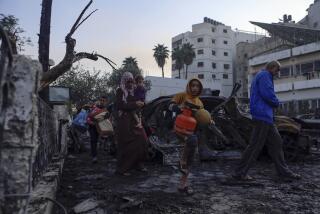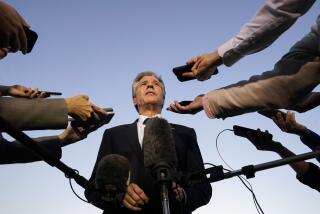U.S. to Back Arabs ‘Who Take Risks for Peace’
- Share via
WASHINGTON — Secretary of State George P. Shultz, in a strong signal to Jordan’s King Hussein and other moderate Arab leaders, said Sunday that the United States will support those nations “who take risks for peace” in the Middle East.
Shultz, in a speech to the American Israel Public Affairs Committee, said, “We know that those Arab nations that are moving toward peace are taking risks.
“As King Hussein took steps to move with the Palestinians to the negotiating table, we saw Jordanian diplomats killed; we saw Jordanian airlines offices bombed.
“Those who take risks for peace should know that the United States will help them defend themselves,” he continued. “The United States must continue to support those who seek negotiations and peaceful solutions against those who promote violence and oppose peace.”
Shultz, originally greeted with some skepticism by Jewish leaders when he took office, was warmly received by the members of the pro-Israeli lobby, who interrupted his speech with applause more than two dozen times.
The secretary stuck generally to the issue of Middle East policy, making only a passing reference to President Reagan’s request for $14 million in aid for the rebels fighting the leftist Nicaraguan government and to U.S.-Soviet relations.
He did not comment at all on the new tensions between the White House and the Jewish community over Reagan’s planned visit to a West German cemetery that includes the graves of a few dozen Nazi SS (elite force) troops.
But before Shultz’s appearance, leaders of the pro-Israeli committee made public a letter to Reagan urging the President to cancel his visit to the cemetery, charging it “could well ignite a resurgency of neo-Nazism in Germany and elsewhere.”
In the Middle East, Shultz said, there “are signs of a new realism and a new commitment on the part of key regional actors.”
Noting that both Israeli and Jordanian leaders have shown a willingness to move toward negotiations, Shultz said: “There is also movement in the Palestinian community toward greater realism, and (Egyptian President Hosni) Mubarak has played a constructive role in promoting negotiations.
More to Read
Sign up for Essential California
The most important California stories and recommendations in your inbox every morning.
You may occasionally receive promotional content from the Los Angeles Times.













